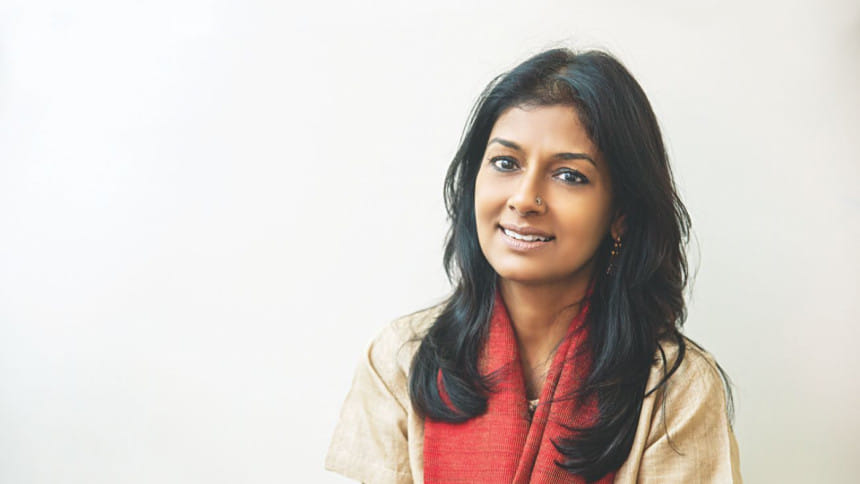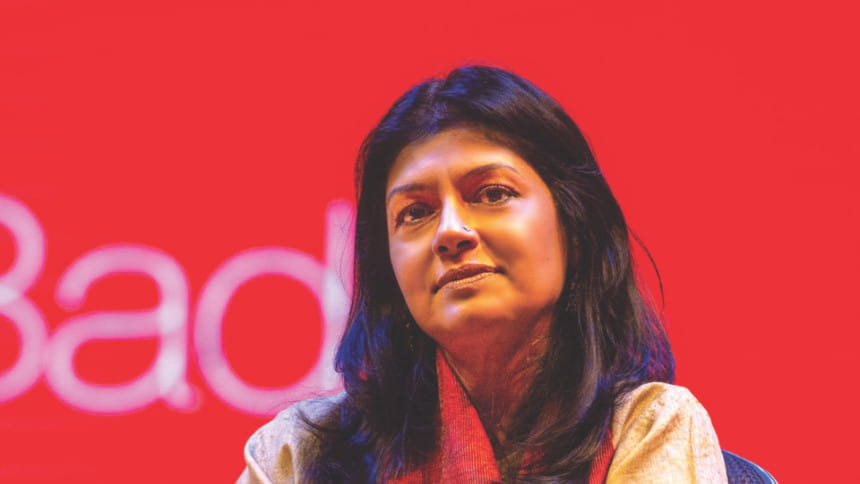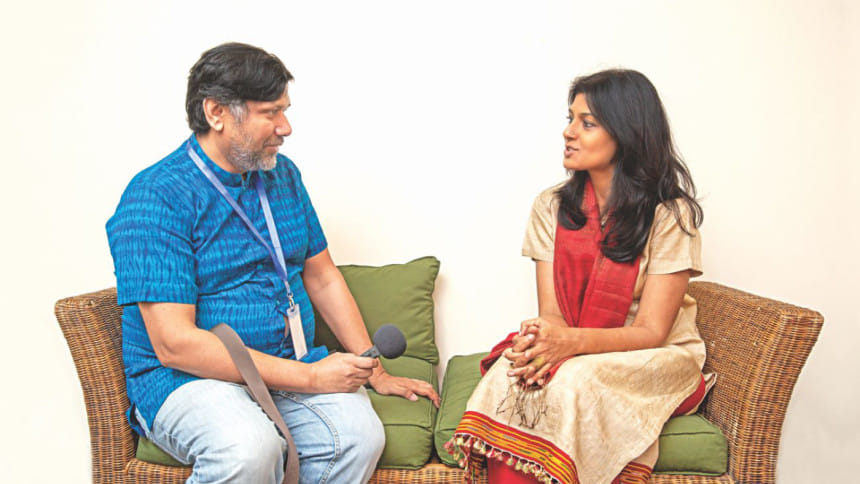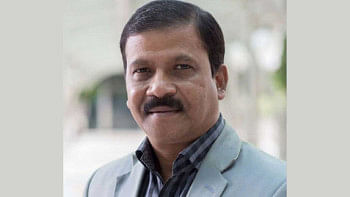NANDITA DAS RELIVING WITH MANTO

Rafi Hossain: We are meeting after a long time! How have you been, Nandita?
Nandita Das: I have been fine, thank you!
Rafi: Your film Manto has been featured at the 2018 Cannes Film Festival. What are your reactions on this?
Nandita: Cannes is one of the most prominent film festivals across the world. I had been fortunate to be a part of it before as a member of the jury. In 2005, I was a part of the main jury, and in 2013, a member of the jury for short films. But it was my first time joining Cannes as a director. It was the first screening event of my film as well. A lot of renowned artists, cast and crew members were present. A team of about 24 of us sat down to watch the film together. And in the end, Manto got a standing ovation! It was indeed a vivacious moment for me, because they were not general audience. Cannes is a festival for only professionals, one has to be a member of the fraternity to be a part of it. The audiences were those who get exposed to a lot of films day in, day out. And a standing ovation from them honestly means a lot.
Rafi: How was your experience joining Cannes, specifically as a director?
Nandita: Film viewing is a very subjective thing. I have learned this through my experience. The same film can create a diverse range of impressions over the minds of different audiences. I still remember that in 2005, I sat in the jury with eight other people who are considered to be immensely skillful and seasoned in their work sphere. Artists like Salma Hayek, Javier Bardem, John Woo and Nobel Laureate Toni Morrison were there, and there I had realized that even all those bright, genius minds had conflicting views about the same films! Which is why now I do not re-watch my films to seek any point for rectification or go through the critiques' feedbacks. Once 'the baby is out', you have to accept whichever way the individuals are reacting to it without being morally shaken or overjoyed.
We have somewhat accustomed ourselves to some certain prerequisites with Indian mainstream films. Like we have to have a twiddle here, then a romantic song there, we have to laugh at this, and then we have to cry at that. I have come out of all the 'default' formats, and tried to make a film that has lesser intentions to strike with emotional twists. And yet Manto has managed to touch a lot of people's minds so far in various ways. Overall I am happy with the way my film has turned out to reach the mass audience and create a consequential impact.

Rafi: It was your second full-length production. Did you feel yourself to have become more adept as a director throughout the process?
Nandita: Of course, I did. Firaaq was released ten years ago. One definitely changes in ten years; not just with technical efficiency but also as a person, as a human being we become differently motivated with time. Though later I felt that Firaaq and Manto has some connections, it happened very organically beyond my intentions. Amidst the ever-growing chaos and crisis over religious issues everywhere, I have always felt a drive to create a difference. 'Why do people have so much hatred? Why do we have so much prejudice in the societies?' – I have always wondered. These concerns have uniformly been knocking in the back of my mind. To tell the truth, global political scenario is still the same as it was ten years back, perhaps now even worse. And so I tried to portray my messages and views through Manto. I could never support violence or justify crimes and wars over religion. I think that is why both my films are set on the plots of historically vehement hours, yet made without any violence projected. Firaaq was based on the Gujarat riots, and Manto is plotted on the India-Pakistan partition. Both the films solely focus on the impact of the violence, the social and psychological trauma that have been induced by the ferocity all around. Coming back to the point, I do believe in periodical metamorphosis. I have become mellower with passing time.
Rafi: So your opinion is that self-development is a continuous journey?
Nandita: Exactly. Making a film itself has never really been the end goal for me. Reaching many minds through the core message was the primary target. I am sure I am not the only one who is troubled by the casualties of the prejudice, and I think if we can have a dialogue together, if we converse and challenge the unjust, we will be successful at some point. One single film may not bring down a revolution. But what we see, what we read can leave very deep impressions inside our minds. And we all are products of our own perceptions.
Rafi: Your first screening was in Cannes, and then the next one took place in Dhaka. Did you find any difference in the feedback of the audience?
Nandita: There were both differences and similarities. I have been to Sydney, Toronto, London, Singapore and many other different countries' film festivals with Manto. But this was the first public screening that was not a part of any film festival. The audience has been really warm and welcoming in Dhaka. This is actually my second time coming here, before this I came in 2012. The audience has been very pertinent; they were asking thoughtful questions. They have a very nuance kind of thinking. I think when a country has such a long history of socio political unrest and turmoil, people in general become stronger fighters. Their journey is extremely authentic and true. When the socio-political activities become more and more right-wing, skepticism among the mass is bound to arise. I see the same happening in Pakistan, in Sri Lanka, in South-Asia overall. The people in Dhaka too are very aware of the socio-political episodes, and seem very much engaged to it.

Rafi: Are you interested in officially releasing Manto here in Bangladesh?
Nandita: Yes, I would love to do that. But it came to my knowledge that there are some complications here regarding the policies. We are discussing the necessary measures. In fact, the other day, I met the Minister for Cultural Affairs Asaduzzaman Noor. He assured me of his full cooperation. As a storyteller, I would definitely want to spread my work among not just this discerning audience, but amongst all the people who are living in the middle of such alarming social crisis. Manto has been released in India on September 21, and it is going to come on digital platforms shortly.
Rafi: Let us know about your thoughts on the ongoing '#MeToo movement'.
Nandita: I think it is a very important movement. It took even the most powerful female personalities of Hollywood a long time to open up about the misfortunes they had to face. Since we live in a patriarchal society, it was expected that our women would require even more time, but thankfully, it is happening now. Having said that, we also have to believe in a due process. We must not trivialize this movement. It is a very powerful gesture, and we must know what allegations we are looking at. I am not sure about the case here in Bangladesh, but in India, sexual abuse happens at a very high rate. Among all the casts and in all the societies it is occurring every often. We are reading about it every single day. So we cannot afford to lose this movement in oblivion. And we must speak for all the women, not just for the privileged part of the society.
Rafi: Do you ever miss working in the mainstream media?
Nandita: I have never really worked for the mainstream media, so there is no question of missing that. It is like asking a vegetarian whether he or she misses eating chicken biryani (laughter)! I have always loved working with peerless scripts that has more to it rather than traditional drama. I work independently, with no regrets whatsoever!
Rafi: Thank you, Nandita, for your time!
Nandita: You are welcome, Rafi bhai!

 For all latest news, follow The Daily Star's Google News channel.
For all latest news, follow The Daily Star's Google News channel. 








Comments